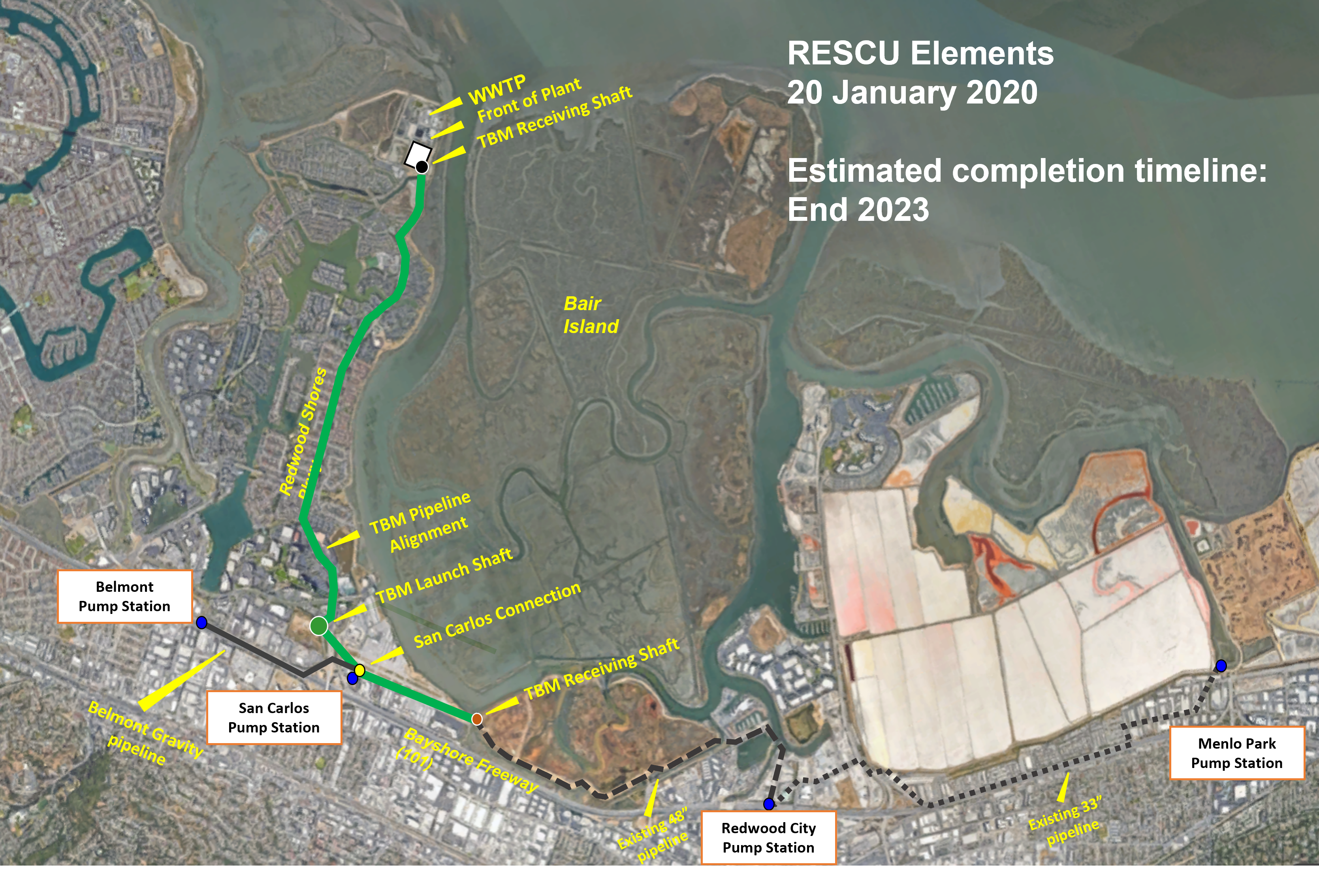RESCU Program Overview
On Thursday, April 13 2017, Silicon Valley Clean Water (SVCW) Commission approved the Regional Environmental Sewer Conveyance Upgrade (RESCU) Program, which consists of replacing or rehabilitating various components of the existing conveyance system, including pipelines and pump stations (see RESCU Overview graphic).
As a prerequisite to project approval, the Commission:
- Certified the final project environmental impact report (EIR), a report that assesses potential environmental impacts and identifies mitigation measures to reduce or avoid adverse environmental impacts.
- Adopted findings from a mitigation monitoring and reporting program; Results of the environmental impact assessment indicate that RESCU would not result in significant and unavoidable impacts, as significant impacts have been reduced to below significant levels through implementation of mitigation measures.
RESCU Program objectives are:
- Replace the existing wastewater infrastructure and construct other improvements to ensure reliable operation of the overall wastewater conveyance system in accordance with San Francisco Bay Regional Water Quality Control Board (RWQCB) permit conditions.
- Reduce the likelihood of spills and discharges of untreated sewage to the surrounding environment.
- Implement a Program that minimizes adverse environmental effects, adverse impacts to public health and private property owners, utility interference and disruption during construction, and short-term and long-term costs.
- Improve SVCW’s Wastewater Treatment Plant process reliability and increase operational readiness.
- Meet future regulatory requirements imposed by the RWQCB.
RESCU consists of three key components: the gravity pipeline project, the front-of-plant project, and the pump stations improvements project. The $224 million gravity pipeline project is the replacement of the 48-inch and 54-inch force main segments between Bair Island and the SVCW treatment plant at 1400 Radio Road, Redwood City. The $128 million front-of-plant project includes a Receiving Lift Station, a Headworks, an Influent Connector Pipeline, and other support facilities, all located adjacent to the current SVCW treatment plant. The $103 million pump stations improvements project includes the rehabilitation or replacement of the Belmont, Redwood City, and Menlo Park pump stations.
All three projects use a progressive design-build (PDB) project delivery process. For more information on how SVCW decided on the PDB process, please check out this link (Link to slides that is already on the website)
The schedule for the gravity pipeline design and construction spans from fall 2017 through summer 2022 and the schedule for the front-of-plant facilities design and construction spans from fall 2017 to fall 2022. Both projects started construction in mid to late 2018, with site preparation construction activities occurring at the front-of-plant area in summer 2017 to avoid wet weather impacts to this portion of the project. The schedule for the pump stations improvements project commenced after both the gravity pipeline and front-of-plant projects started; the schedule spans from spring 2019 through summer 2023.
RESCU program components are located within the cities of Belmont, Menlo Park, Redwood City, and San Carlos.
Upon completion of RESCU, SVCW can efficiently, reliably, and safely convey and treat wastewater from its four member agencies, Belmont, San Carlos, Redwood City, and the West Bay Sanitary District (which provides sanitary sewer collection services to the cities of Menlo Park, Portola Valley, and portions of Atherton, Woodside, East Palo Alto, and unincorporated areas of San Mateo County) for many decades to come.
The individual members of the JPA own and operate the sanitary sewer collection systems within their respective jurisdictions, and SVCW owns and operates the wastewater treatment plant (WWTP) as well as the sanitary sewer force main and pump stations that convey the sewage to the treatment plant.
